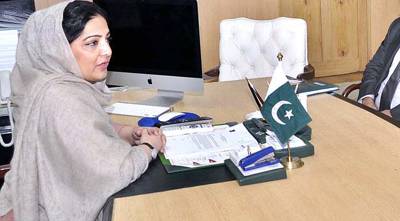UNITED NATIONS: Pakistan today called for enhanced cooperation among states and other stakeholders to strengthen security in the use of information and communication technologies (ICTs), saying their malicious use in cyberspace posed risks to users.
"Use of cyberspace by criminals and terrorists cannot be permitted and we, as responsible members of the global community, must ensure that such elements do not operate in cyberspace to further their nefarious designs," Information Technology Minister Anusha Rehman Khan told the U.N. General Assembly, which is considering the application of ICTs ten years after the historic world summit.
"The growing menace has serious implications for international peace and security," she said in a speech to the 193-member Assembly's high-level meeting.
Mrs. Rehman Khan urged a collective approach to confronting attacks against critical infrastructure and underscored the need to optimize cyberspace management under an institutional framework.
"The global community needs to agree on minimum standards of protection for human dignity particularly for women and children being the most vulnerable communities of the cyberspace," the minister said.
Opening the meeting, Mogens Lykketoft, General Assembly President, said that since the 2005 World Summit, when leaders had declared a common desire and commitment to build a people-centred, inclusive and development-oriented information society, huge progress had been made in the information and communications technology (ICT) field. However, challenges remained, such as the digital divides among countries, as well as Internet security and human rights issues, he said.
Secretary-General Ban Ki-moon also raised some concerns, noting that while more than 80 per cent of households in developed countries had Internet access; two out of three in developing countries did not.
Additionally, 200 million fewer women than men had access. He urged the international community to bridge those divides especially in light of the new 2030 Agenda for Sustainable Development, which included information and communications technology targets.
In her remarks, Anusha Rehman Khan said, "Our Government under the visionary leadership of Prime Minister Muhammad Nawaz Sharif fully realizes the potential of ICTs to spur socio-economic growth." Pakistan, she said, considered it as a key enabler to achieve efficiency, transparency, good governance and empowering the people. "We are pursuing with the vision of accelerated digitization to transform Pakistan into a knowledge based economy."
The minister said ICT was a true driver of economic growth. Broadband proliferation was Pakistan's policy priority and it had achieved notable progress in that regard through legislative and policy frameworks. The ICT journey had led to an increasingly interconnected world with the novel use of cyberspace resulting in economic and social opportunities for Internet users.
Mrs. Rehman Khan said the current focus should be on bridging the digital divide to enable access for excluded populations to the immense knowledge platform. The benefits of a shared cyberspace were enormous; however, some worrisome trends in safety and security had emerged. "The concerns over safety and security potentially impede the objective of accelerated development and affect the confidence of people in using applications and services offered to traverse the cyberspace."
"The aspect of building capacity in countries which lack expertise is also essential to achieve global deterrence against such threats," the minister said. Pakistan, she said, has followed the policy of free flow of information and open access to the internet. "We will continue our support and assistance to initiatives aimed at achieving our shared goal of socio-economic development through safe and secure use of ICTs."






